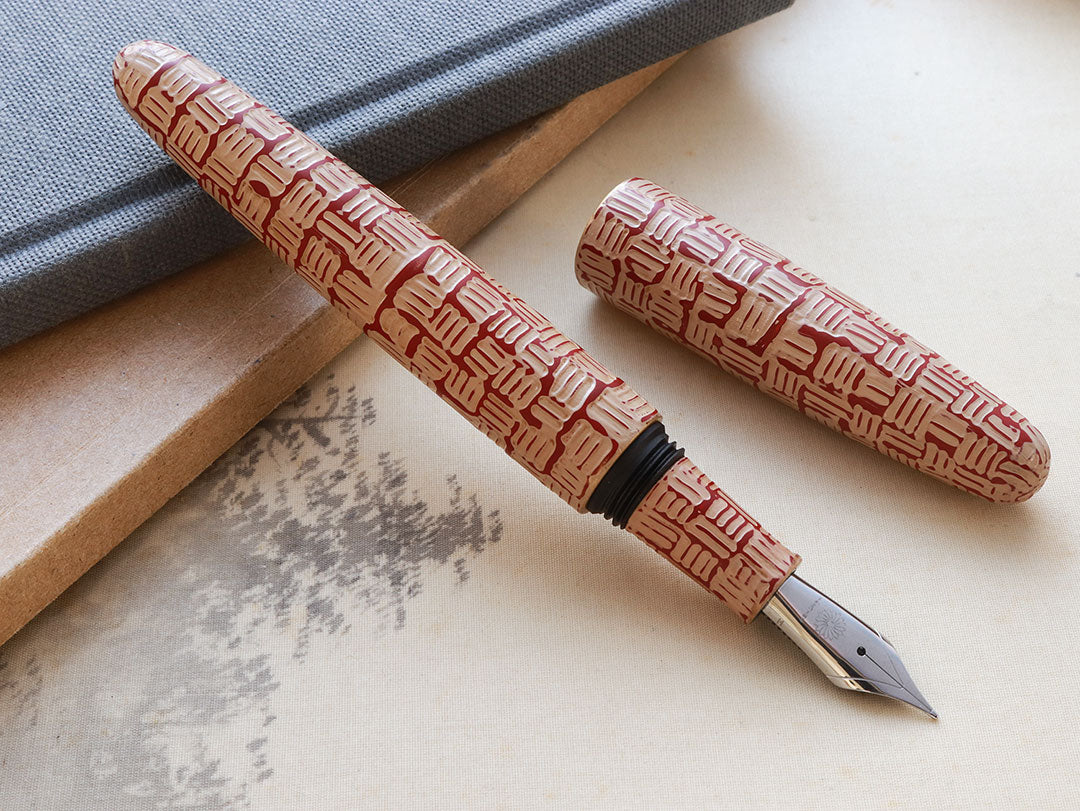Hirota Urushi - Kushime Tsuishitsu Nuri - Akane
Hirota Urushi - Kushime Tsuishitsu Nuri - Akane
Couldn't load pickup availability
Description
Description
Important Notice: The hand-making process makes every single pen a unique one, there is no pen exactly resembling one another. The one you will receive might be slightly different from the one here in the pictures but if you appreciate that beauty of hand-craftsmanship, you will be happy with the pen we've made for you.
Akane
Akaneiro is a color with a deep history that has been used since ancient times worldwide. The contrast between these two colors is truly stunning: the red hue of the sky at dusk and the pale, light, egg-colored white lacquer. "As a piece where you can fully savor the delight of playing with these colors, it blooms vividly through the distinctive technique of lacquer artist Yoko Hirota, known as 'Kushime Tsuishitsu-Nuri". It is elegant and beautiful.
Hirota Urushi
Hirota Urushi is the Japanese traditional Urushi arts hand-crafted by master Hirota Yoko (廣田洋子). Master Hirota's artworks are unique in designs and techniques which are hard to find among common Urushi lacquerwares.
There are 4 main techniques normally used in master Hirota's art:
- 櫛目堆漆塗 (Kushime Tsuishitsu Nuri)
- 金箔 (Kinpaku)
- 石目堆漆塗蒟醤 (Ishime Tsuishitsu Nuri)
- 金彩ひび塗 (Kinsai Hibi Nuri)
Fountain pens from Hirota collection are handmade one by one and require years to create. Therefore, each design is limited to only 1-3 pieces.
About Master Hirota Yoko
With a great interest in traditional handmade crafts since elementary school, master Hirota decided to choose this path and developed a strong passion for Japanese Urushi-making traditions. Master Hirota now has more than 30 years of hands-on experience in making Urushi and Maki-e.
Hirota's artwork focus on the stylish minimalism and durability of the objects. Either it's a pair of chopsticks that serve everyday meals or it's an ornament used in the palace, it must last long and express aesthetics of Japan's art.

Background of master Yoko Hirota:
1988: Graduated from Joshibi University of Art and Design
1991: Completed research course at Kagawa Prefecture Urushi Art Institute; Selected for Japan Traditional Lacquer Art Exhibition
1993: Graduated from Kagawa Prefecture Urushi Art Institute; Fukuoka Art Exhibition First Prize
1994: Fukuoka Art Exhibition Board of Education Award; Selected for Japan Industrial Arts Association Western Art Exhibition
1995: Selected for Japanese Traditional Crafts Exhibition; Western Crafts Exhibition Urasoe Mayor's Award
1996: Buzen City Cultural Merit Award
1997: Seibu Crafts Exhibition Award of Mayor of Urasoe
1998: Fukuoka Art Exhibition West Japan Newspaper Award
1999: Became a member of Fukuoka Art Association; Certificated as a regular member of Japan Crafts Association
2004: OAB Oita Asahi Broadcasting Award at Western Crafts Exhibition
2005: Oita Mayor's Award at Western Crafts Exhibition
2006: Solo Exhibition at Buddha Museum
2008: Western Traditional Craft Exhibition Asahi Welfare Culture Corporation Award
Specifications
Material & art: Ebonite, Urushi
Filling mechanism: Converter or Cartridge (European International Standard)
Nib: #6 Jowo stainless steel, Wancher 18K gold
Feed: Plastic, ebonite black, ebonite red
Compact air-tight cap: Preven dried-out ink problem

Size & Shape

Packaging
Traditional Japanese Wooden Box + Cartridge & Converter + Instructional Materials

Share













